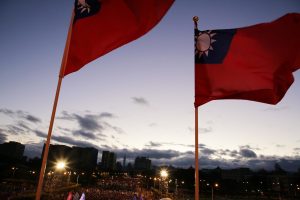October 25 of this year marks the 50th anniversary of the United Nations General Assembly Resolution 2758, which, in 1971, seated the People’s Republic of China (PRC) in the United Nations and its Security Council and, simultaneously, expelled Chiang Kai-shek’s representatives, who had retreated to Taiwan after losing the Chinese civil war.
While this resolution is now half a century old, it is still very much relevant to today’s Taiwan, as its population of 23.5 million is excluded from most international participation because of it. While UNGA Resolution 2758 is about the question of who represents China at the United Nations, the United Nations and its affiliated organizations have continually invoked it to deny the Republic of China (Taiwan) participation in a whole range of international forums.
Yet, contrary to the myth promoted by Beijing, the resolution does not actually provide any legal basis to exclude Taiwan’s international participation. When states voted on the resolution in 1971, they only voted on one question and one question only: which government was the legitimate representative of China in the United Nations. Should it be the Republic of China (ROC) government on Taiwan or the PRC government on the mainland? The resolution “recognize[d] that the representatives of the Government of the People’s Republic of China are the only lawful representatives of China to the United Nations.”
The resolution did not determine other questions such as Taiwan’s participation in U.N. bodies in its own right so long as Taiwan’s government does not claim China’s U.N. seat. Nor did the resolution determine Taiwan’s sovereignty, which should be decided based on international law. As Jerome A. Cohen and I have argued in another essay, “The United Nations is legally free to recognize that Taiwan has all the characteristics of statehood, as it does, and admit it as a new member.”
In 1971, the representatives of Chiang Kai-shek were expelled from the United Nations because they insisted that the ROC government was the only legitimate representative of China. But the stance of today’s Taiwan could not be further from that position. The current government of the Democratic Progressive Party under President Tsai Ing-wen does not seek to represent China. What Taiwan seeks is pragmatic, meaningful participation, including acting merely as an observer in many contexts, in order to enhance Taiwan’s cooperation with organizations governing important global issues such as the World Health Organization (WHO), International Civil Aviation Organization (ICAO), and the International Criminal Police Organization (Interpol). Taiwan’s input into the substantive discussion in these types of organizations would only enhance their ability to carry out their very practical and essential missions.
These organizations are certainly free to allow Taiwan’s observer status in accordance with their own rules, just as the WHO’s director general invited Taiwan to take part in the World Health Assembly (WHA) as an observer from 2009 to 2016. At the time, neither the WHO nor the Chinese government claimed Taiwan’s observer status to be a violation of any U.N. principles or international law. Beijing accepted Taiwan’s participation because of its political rapprochement with the then-Taiwan government ruled by the Nationalist Party (KMT).
In a nutshell, Taiwan has the legal capacity to take part in international organizations but is shut out of most of them because of politics, not legal barriers. At present, because of Beijing’s continual obstruction, it is very difficult, if not impossible, for Taiwan to take part as an observer in the United Nations or any of its affiliated organizations (no matter how functional their mandate), let alone obtain U.N. membership as the state of Taiwan. One of Asia’s (and the world’s) most dynamic economies and highest-functioning democracies is prevented from representing its people’s interests or sharing its developmental best practices with the world because of Beijing’s political whims.
However, Taiwan must think creatively, as it does with ratifying and implementing international human rights treaties as a non-U.N. member state. In addition to striving to join existing global and regional institutions (often under some creative but sometimes awkward names, such as a fishing entity, that do not intimate its statehood), Taiwan should take the initiative to create further cooperative opportunities, expanding its own bilateral and multilateral networks, with the help of other countries and like-minded partners.
A good example of this is the Global Cooperation and Training Framework (GCTF), initially established as a platform between the United States and Taiwan to share good governance best practices. The GCTF, from its modest beginnings, has gradually expanded into a larger network for Taiwan to connect with not only the United States but also Japan and other countries on myriad global issues. It serves as a model for Taiwan to think innovatively and cooperate strategically through multilateral as well as bilateral frameworks other than the United Nations.
Yet, ultimately, it falls on the current international regime (including the United Nations and its member states) to reconsider their policy toward Taiwan, which they are free to do under international law.
Circumstances have changed greatly over the past 50 years. Taiwan’s 23.5 million people have overcome long odds to build one of the world’s most prosperous and dynamic democracies. They have developed cutting-edge technology critical to the global economy and have mastered COVID-19 while safeguarding individual rights and freedoms. Taiwan has much to offer the international community; it also has much to learn. And – unlike many current U.N. member states – it is more than willing to do both.
Including Taiwan would be the smart thing to do. It would also be right.

































